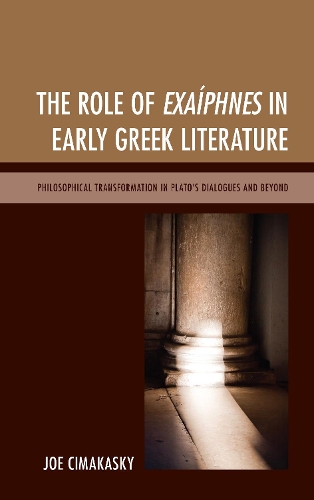
The Role of Exaphnes in Early Greek Literature: Philosophical Transformation in Platos Dialogues and Beyond
(Hardback)
Publishing Details
The Role of Exaphnes in Early Greek Literature: Philosophical Transformation in Platos Dialogues and Beyond
By (Author) Joseph Cimakasky
Bloomsbury Publishing PLC
Lexington Books
12th April 2017
United States
Classifications
Professional and Scholarly
Non Fiction
184
Physical Properties
Hardback
184
Width 158mm, Height 240mm, Spine 18mm
408g
Description
There are thirty-six appearances of the Greek word exaphnes in Platos dialogues. Usually translated as all of a sudden or suddenly, exaphnes emerges in several significant passages. For example, exaphnes appears three times in the allegory of the cave from Republic vii and heralds the vision of the Beautiful in Symposium. Commonly translated in the Parmenides as the instant, exaphnes also surfaces in a crucial section of the dialogues training exercise. The Role of Exaphnes in Early Greek Literature: Philosophical Transformation in Platos Dialogues and Beyond connects the thirty-six scattered appearances of exaphnes and reveals the role it plays in linking Platos theory of Ideas with education. Joe Cimakasky discloses how Platos step-by-step, methodical approach to philosophical education climaxes with a dynamic conversion experience signified by the appearance of exaphnes. Cimakasky shows how Platos conception of exaphnes was transformative with respect to how the term was used in Greek literature by his predecessors and influential for ensuing philosophers. Following Plato, exaphnes and its cognates came to represent the peak of philosophical or theological enlightenment. The Role of Exaphnes in Early Greek Literature traces the meaning of the term in Greek literature prior to and contemporaneous with Plato, Platos innovative use of exaphnes, and the impact of Platos notion of the sudden upon subsequent thinkers. This book will be of interest to students and scholars of philosophy, ancient philosophy, pedagogy, ethics, and hermeneutics. In addition, those working in religious studies will appreciate the focus on conversion narratives and their emergence in ancient philosophical and Biblical texts.
Reviews
Joe Cimakasky provides a fascinating treatment of a truly timeless topic.The instant or the sudden (exaiphns) appears in turning-point passages in Plato, and this fine book crucially traces the trajectory of its appearance prior to, in Plato, afterwards, and even up to the present. -- Ronald Polansky, Duquesne University
With its unique insight concerning participation, this book has changed the way I read Plato. -- William Irwin, King's College, Pennsylvania
Author Bio
Joseph Cimakasky is assistant professor at Cabrini University.
